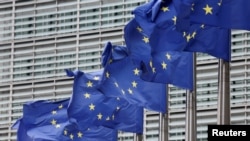European Union leaders are preparing to issue a joint statement underlining the bloc's support for Ukraine's territorial integrity and the need for Kyiv to be at the table of any talks on its future ahead of a meeting between US President Donald Trump and his Russian counterpart, Vladimir Putin, in Alaska.
The seven-point draft statement, seen by RFE/RL, was circulated among EU member states after an online meeting of the bloc's foreign ministers late on August 11.
The meeting was called over the weekend to compare notes and come to common positions after US envoy Steve Witkoff met with Putin last week and the subsequent briefings to various European leaders and officials by US Vice President JD Vance in England.
The participants in the meeting said they recognized the need for dialogue with the United States before Putin and Trump meet so that the US side is not lured into Putin's "trap," said an EU diplomat who spoke to RFE/RL on the condition of anonymity.
The diplomat added that a cease-fire and "deliverables" are needed from Russia before talks about long-term peace, territorials claims, and other matters can be addressed.
Several European diplomats that RFE/RL reached out to say there is some confusion regarding what Witkoff actually discussed in his August 6 meeting with Putin, including potential territorial swaps and Moscow's willingness to actually accept a cease-fire.
The text says EU states "welcome the efforts of President Trump toward ending Russia's war of aggression against Ukraine and achieving a just and lasting peace and security for Ukraine."
But it adds that such a peace "must respect international law, including the principles of independence, sovereignty, territorial integrity and that international borders must not be changed by force."
The draft is similar to a statement issued over the weekend by a handful of European leaders with the hope, according to EU officials that RFE/RL has been in touch with, that the rest of the club can get behind a set of common principles to give Ukraine much-needed diplomatic backing.
It is not yet clear yet whether Ukrainian President Volodymyr Zelenskyy will attend the meeting in Alaska, but the document notes that "the path to peace in Ukraine cannot be decided without Ukraine."
The statement, which the diplomat said will be issued on August 12, is likely to be backed by 26 EU countries. Hungary, which often has refused to back common EU stances on Ukraine, is not expected to be among them.
Recent EU summit conclusions on the topic have been published as EU-26 without Budapest's backing even though the Central European country agreed to further EU sanctions on the Kremlin in July.
On the question of territory, the EU supports the Ukrainian position of no de jure recognition of any territories.
The diplomat said there is a feeling that it is unrealistic that Ukraine would give up Kramatorsk, for example, a place that has been fought over since 2014.
The text notes that the club "will also continue to uphold and impose restrictive measures against the Russian Federation," indicating that it isn't yet ready to discuss sanctions relief for Moscow, something that appeared to be a topic between Witkoff and Putin. Consensus is needed to lift parts or all of the sanctions, but the entire raft of measures are up for renewal again via unanimity in January 2026.
European countries, as well as the EU as an organization, have so far failed to secure a place at the table of any talks between Kyiv, Washington and Moscow.
The French President Emmanuel Macron and the British Prime minister Keir Starmer earlier this year proposed a "reassurance force" with up to 20,000 European troops in the Western part of Ukraine as soon as a cease-fire between Kyiv and Moscow was agreed.
While some planning went into it, the plan is "very much dormant," says one European diplomat with knowledge about the discussion, especially as the Europeans couldn't secure support from the Americans when it comes to the military backup needed for such an endeavor.
The text, without offering any specifics, instead refers to a readiness to "further contribute to security guarantees based on their respective competences and capabilities."
It adds that "the European Union, in coordination with the US and other like-minded partners, will continue to provide political, financial, economic, humanitarian, military and diplomatic support to Ukraine as Ukraine is exercising its inherent right of self-defense."











